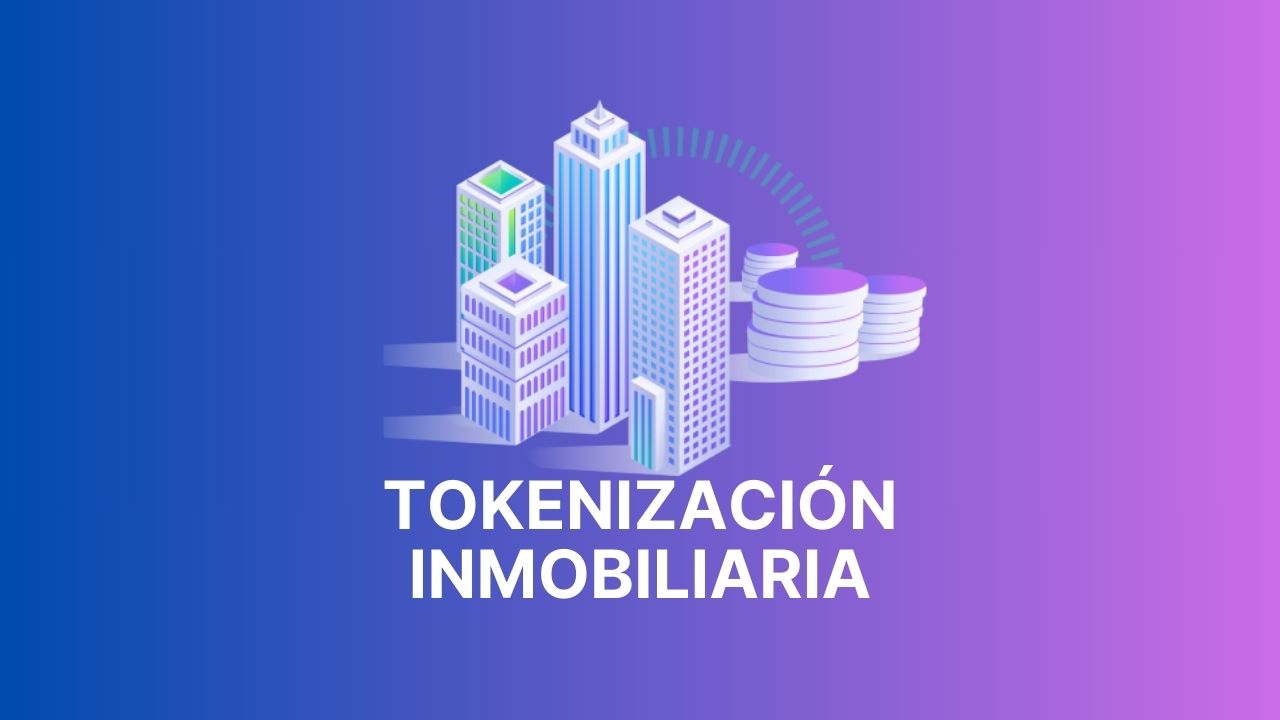Currently, we are witnessing an era of constant innovation, where technology is integrating into all aspects of our life. From our work interactions to the way we communicate, digitalization and decentralization are producing a significant shift.
In this context of continuous change, one of the most impactful developments is real estate tokenization and its profound relationship with blockchain technology. This innovation is revolutionizing the way we understand and manage property and investment in real estate.
Real estate tokenization is summarized in the division of the ownership of a real estate asset into digital tokens that are recorded on a blockchain. Each of these tokens represents a fraction of the ownership and can be easily bought, sold, or exchanged on specialized platforms. This technology is opening the doors to more accessible and liquid real estate investments, allowing a broad range of investors to participate in the real estate market.
Blockchain technology plays a fundamental role in real estate tokenization. It provides a secure and transparent foundation for the record of ownership and token transactions. Additionally, smart contracts allow for the automation of processes such as income distribution and voting rights, reducing the need for intermediaries and ensuring precise execution of agreements.
In this article, we will explore in detail how real estate tokenization is transforming property and investment in real estate. We will discuss its benefits, applications, and opportunities for both investors and property owners. As we progress, we will delve into the technical, legal, and economic aspects of real estate tokenization, and how this trend is shaping the future of real estate investment worldwide.

Tokenization of Real Assets: The Future of Investments?
The tokenization of real assets has emerged as a disruptive innovation that is reshaping the landscape of investments and financial markets. The convergence of blockchain technology and investment in tangible assets, such as real estate, art, and others, raises intriguing questions about the future of investments.
In a world where digitalization is constantly growing, the tokenization of real assets represents a paradigm that challenges traditional limitations. It allows investors to fractionalize assets into digital tokens, facilitating access, diversification, and liquidity in investments that were previously inaccessible or rigid.
Real estate tokenization, in particular, has taken the lead by enabling investors of all levels to participate in the real estate market, previously reserved for a few. This democratizing and decentralized approach has the potential to dramatically transform how properties are bought, sold, and invested in.
The transparency, security, and efficiency of blockchain technology are also changing the way assets are managed. Tokenization improves traceability and reduces the risk of fraud, which can increase investor confidence.
However, it cannot be overlooked that the tokenization of real assets faces significant challenges, such as evolving regulation, cybersecurity, and the need for widespread education on blockchain technology.
As this trend continues to develop, the fundamental question remains: is the tokenization of real assets the future of investments? Although it cannot be predicted with certainty, its potential to democratize access to investments and improve efficiency in asset management suggests that it is well positioned to play a key role in the next evolution of the investment world.
What is Real Estate Tokenization?
Real estate tokenization is a concept that combines two key elements: tokenization and the real estate sector. Tokenization is a process that involves converting physical or financial assets into digital tokens or digital assets on a blockchain. In the real estate context, this refers to the transformation of real estate assets, such as buildings, land, or properties, into digital tokens that can be bought, sold, or traded on a blockchain-based platform.
The tokenization of real assets, in the financial and technological context, is the process of converting physical or tangible assets, such as real estate, artworks, stocks, bonds, or other assets, into digital tokens represented on a blockchain or digital platform. These tokens represent ownership or a stake in the underlying asset, and their value is backed by the real assets they represent.
Real estate tokenization, often called “real estate tokenization,” is a specific form of real asset tokenization that focuses on converting real estate properties into digital tokens. Each token represents a fraction of ownership of the underlying property. This means that investors can buy and sell these property fractions more easily, reducing the barrier to entry into the real estate market and allowing for investment diversification. Additionally, by utilizing blockchain technology, transparency, security, and efficiency in real estate transactions are improved.
Advantages of Real Estate Tokenization Over Traditional Systems
Real estate tokenization, a technological innovation in the world of real estate, presents a number of revolutionary advantages that are transforming the way people invest in properties. By leveraging blockchain technology to divide real estate assets into digital tokens, unprecedented opportunities are opened up in the real estate market. Here are some of the most notable advantages of real estate tokenization:
1. Global Access and Democratization
One of the most notable advantages of real estate tokenization is the possibility of accessing the real estate market at a global level. Before tokenization, investing in properties typically required a significant investment and often limited investors to local or regional properties. However, with tokenization, investors from around the world can acquire fractions of properties, democratizing real estate investment. This democratization is especially valuable for retail investors and those wishing to diversify their portfolios with real estate assets.
2. Improved Liquidity
Traditional real estate markets often lack liquidity, meaning it can take a long time to sell a property or recover your investment. Real estate tokenization addresses this issue by allowing investors to buy and sell tokens at any time. This provides greater liquidity to the market, as investors are no longer bound to wait years to sell a property. Improved liquidity is especially attractive for those wishing to make short-term investments or needing quick access to their assets.
3. Simplified Diversification
Portfolio diversification is a fundamental principle of investing. Before real estate tokenization, investing in real estate often required large sums of money and a significant commitment to a single property. However, tokenization allows investors to purchase small fractions of multiple properties, simplifying portfolio diversification. This diversification reduces the risk associated with investing in a single asset and allows investors to tailor their portfolios to their financial goals and risk tolerance level.
4. Enhanced Transparency and Security
Blockchain technology, which underlies real estate tokenization, provides an immutable record of all transactions. This enhances transparency and security in the real estate market, as property data and contractual agreements are stored on the blockchain securely. The immutability of the blockchain reduces the risk of fraud and embezzlement, giving investors greater confidence in their transactions.
5. Reduced Costs
Real estate tokenization can significantly reduce the costs associated with investing in real estate. The processes of buying, selling, and managing properties often involve a number of intermediaries, such as real estate agents and banks, which can generate additional costs. With tokenization, many of these processes are automated and simplified, reducing legal and administrative expenses. Furthermore, the elimination of unnecessary intermediaries can decrease the overall costs associated with real estate transactions.
6. Investment Efficiency
Real estate tokenization streamlines the investment process. Investors can conduct transactions more efficiently through online platforms, eliminating the need for bureaucratic paperwork and long waiting times. Additionally, tokenization facilitates participation in smaller, specialized real estate offerings, which can be beneficial for investors wishing to focus on specific market niches.
7. Greater Accessibility for Retail Investors
Before real estate tokenization, investing in real estate was largely reserved for institutional investors or individuals with high net worth. However, with tokenization, retail investors can participate in the real estate market with more modest investments. This expands access to investment opportunities that were previously out of their reach and allows them to benefit from the appreciation of property values.
8. Decentralization and Autonomy
Real estate tokenization often operates on decentralized blockchain networks, meaning it is not controlled by a single centralized entity. This reduces reliance on intermediaries and grants investors a greater degree of autonomy over their investments. Smart contracts, which are self-executing protocols on the blockchain, can also automate processes and eliminate the need for intermediaries in some transactions.
Challenges and Important Considerations
Despite the notable advantages of real estate tokenization, there are a number of challenges and critical considerations that investors and market participants must keep in mind. The adoption of this innovative technology is not without risks and challenges that require careful attention. Some of the main challenges and considerations include:
1. Regulatory Challenges: The laws and regulations governing investment and ownership of real estate vary by jurisdiction. Real estate tokenization is still in a development stage, and specific regulations may change over time. Investors should be aware of local regulations and seek appropriate advice to ensure compliance.
2. Technological Risks: The security of tokenization platforms and the management of private keys are critical considerations. Loss of access to a cryptocurrency wallet or exposure to technical vulnerabilities can have serious consequences. Investors should take steps to protect their digital assets and be aware of the risks associated with blockchain technology.
3. Project and Platform Assessment: Not all tokenization platforms are equal, and it is essential to carefully research and evaluate any project or platform you are considering investing in. Understanding the strength of the team behind the project, the quality of the underlying property, the transparency of the platform, and the guarantees offered is crucial before making an investment decision.
4. Volatile Market: Although real estate tokenization can increase liquidity and accessibility, the markets for digital assets, including real estate tokens, are often volatile. Investors should be prepared for price fluctuations and consider their investment horizons before participating.
5. Privacy and Data Disclosure: Transparency is a major advantage of blockchain technology, but it also raises concerns about privacy and the disclosure of personal data. Investors should understand how their personal data will be handled on tokenization platforms and ensure that their rights and privacy are protected.
6. Education and Knowledge: Real estate tokenization is an emerging technology and can be complex for those unfamiliar with blockchain and cryptocurrencies. Before investing, it is important to educate yourself and acquire a solid understanding of how these technologies work and how they apply to the real estate market.
7. Market Stability and Maturity: Although real estate tokenization is growing, the market is still evolving and maturing. Investors should consider whether they are willing to take on the risks associated with a market that is constantly changing.



